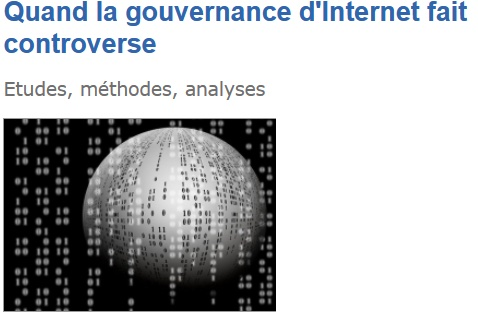In spite of many preconceived ideas, "the Internet is governed " remind Julien Rossi, Francesca Musiani and Lucien Castex, coordinators of this file published by the magazine Terminal. " The coexistence of technical standardization sources and traditional legislative and legal sources gives rise to a multi-actor and multi-level Internet governance, characterized by the presence of several regulatory centers of different nature as well as by the juxtaposition of several normative "layers".
This governance is exercised through a variety of instruments: legal texts adopted by local, national, supranational or international political institutions, contracts between private actors such as Internet access providers or domain name registries, soft law instruments such as charters and technical standards. "All these instruments, even those that are purely technical, such as standards or infrastructure, produce political effects.
The control of these technical infrastructures, which are often "critical" because they are scarce resources of the Internet, remains a central power issue in Internet governance. Discussions focus on topics such as interoperability, openness and network neutrality, privacy protection, surveillance techniques and their regulation, content filtering techniques, security and encryption of communication protocols, artificial intelligence and algorithmic discrimination, and copyright and access to knowledge and culture on the Web.
"In these controversies, political questions are often implicitly placed behind discourses that deal with seemingly purely technical objects. A detailed understanding of the technical dimension of the debates is therefore often an indispensable prerequisite for accessing their meaning on the political level. A specific field of research, at the intersection of international relations, "Science and Technology Studies", law and computer science, has thus emerged.The ambition of this issue of the journal Terminal is to " present the state of the art of French-speaking research on the subject, while revealing the diversity of theoretical and methodological tools used to study the great diversity of socio-technical controversies and arenas of Internet governance.
The interest of this issue lies, indeed, in the ability to study Internet governance without separating the technical from the political.
Stéphane Bortzmeyer discusses the process of developing the Internet's technical standards: "the study of technical standardization and its political consequences is distinguished by the fact that technical and political issues are intertwined, to the point that it is difficult to separate them during debates.Camille Paloque-Bergès, for her part, presents a research program on Unicode, a character encoding format that describes content.Julie Marques discusses projects of ethical charters applicable to Artificial Intelligence, elaborated by companies and associations, through a documentary and textometric approach.Clément Perarnaud presents a qualitative study of the institutional processes of negotiation of export control policies exercised by the European Union on surveillance technologies.Camila Pérez Lagos and Laura Calabrese analyze how the controversy over the Cambridge Analytica scandal unfolded on Twitter, "broadening the focus to the general public by moving beyond the very arenas in which the instruments (laws, charters, standards, protocols, code, physical infrastructure...) through which power is exercised on the Internet are produced."These articles are complemented by four interviews with researchers that complete the thematic overview of current research on Internet governance.
Farzaneh Badii discusses her two current objects of investigation: the effect of US sanctions applied to content delivery networks on connectivity in sanctioned countries, and the writing of a socio-history of Internet protocols. She defends the point of view according to which, contrary to what other researchers and certain actors in the field propose, technical standards are not the adequate instruments for the defense of fundamental rights.Romain Badouard evokes his work on the regulation of content on social networks, and its effects on moderation practices, "through a perspective inspired by Science and Technology Studies but also by document analysis as practiced by historians".Corinne Cath discusses the interest of the ethnographic approach for the study of controversies within the Internet Engineering Task Force, in particular to uncover the political values underlying the technical decisions that are adopted. Finally,Guillaume Sire presents his research on the World Wide Web Consortium, which defines Web standards, and in particular the HTML and ePub formats, on which he has conducted fieldwork "with an approach that borrows from the theory of composites of Joëlle Le Marec and Igor Babou, from the sociology of innovation of Patrice Flichy, but also from the current of Critical Code Studies.Two Internet governance actors, Constance Bommelaer de Leusse and Anriette Esterhuysen, complete the overview by sharing a personal testimony and point of view rooted in the Internet governance institutions in which they operate.
In an encyclopedia entry intended for an English-language volume, Francesca Musiani outlines the debates that have so far marked these attempts at definition, placing them in a historical periodization.
Contents
- Julien Rossi, Francesca Musiani and Lucien Castex: Internet governance, between infrastructures and socio-political spaces: research contributions
- Stéphane Bortzmeyer: Decision-making in Internet technical standardization: the example of DoH
- Laura Calabrese and Camila Pérez Lagos: The Cambridge Analytica case on Twitter: resignation or resistance to digital surveillance?
- Julie Marques: The principle of justice in the governance of artificial intelligence through the lens of gender, class and race
- Camille Paloque-Bergès: Encoding multilingual writing in digital
- Clément Perarnaud: Export controls as instruments of power in Internet governance
- Francesca Musiani: Internet governance, a brief history of a controversial space
- Farzaneh Badiei: Looking for Godot, finding Internet governance
- Romain Badouard: Internet governance, from pipes to content
- Corinne Cath-Speth: The Internet we don't see until it works: an anthropological research on the infrastructure of the Internet
- Guillaume Sire: Web standards: the ins and outs of operating rules
- Interview with Constance Bommelaer de Leusse
- Interview with Anriette Esterhuysen
Référence :





